人教新目标(Go for it)版九年级全册Unit 10 You’re supposed to shake hands-Section B (1a-2e)课件(共68张PPT)
文档属性
| 名称 | 人教新目标(Go for it)版九年级全册Unit 10 You’re supposed to shake hands-Section B (1a-2e)课件(共68张PPT) | 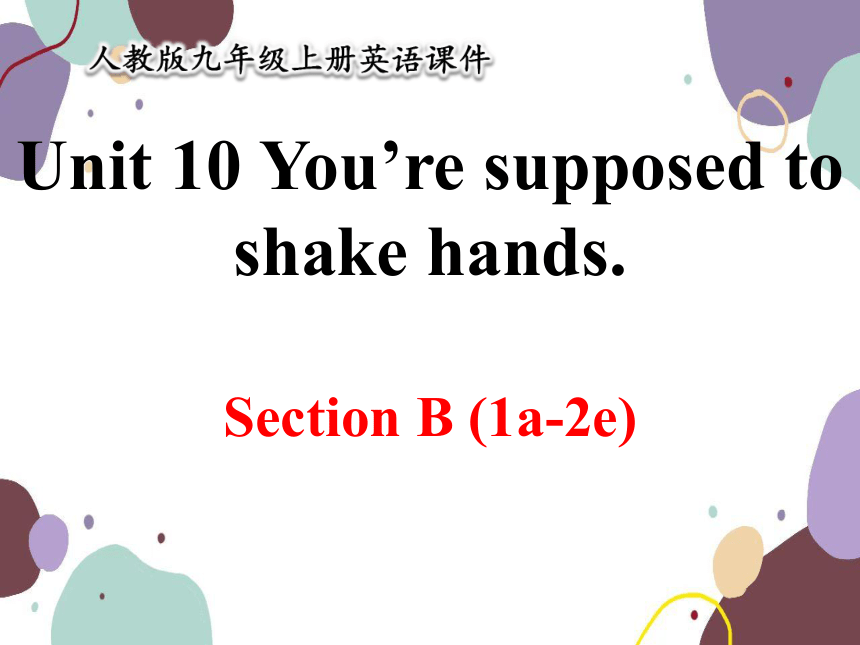 | |
| 格式 | pptx | ||
| 文件大小 | 5.5MB | ||
| 资源类型 | 教案 | ||
| 版本资源 | 人教新目标(Go for it)版 | ||
| 科目 | 英语 | ||
| 更新时间 | 2023-07-05 20:17:39 | ||
图片预览

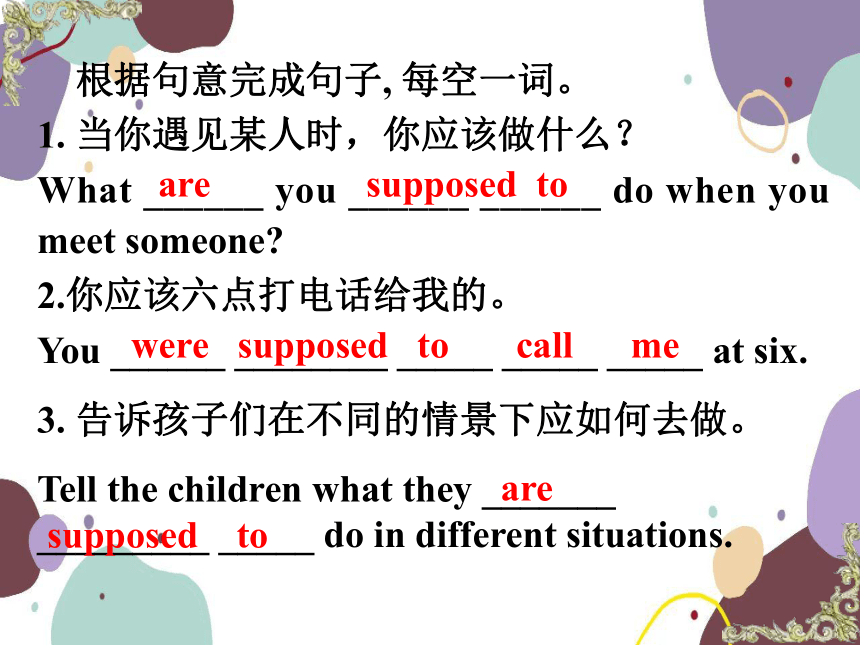

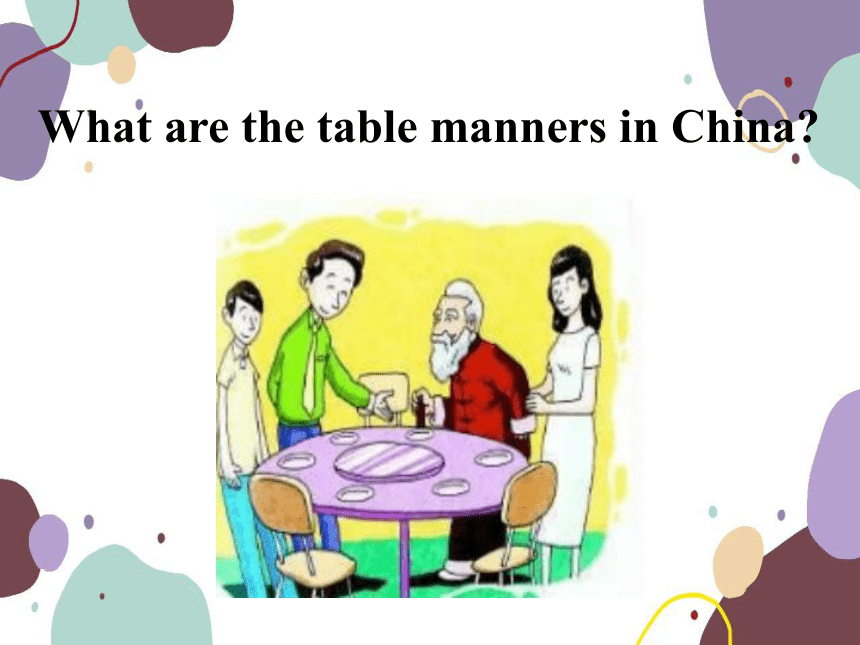
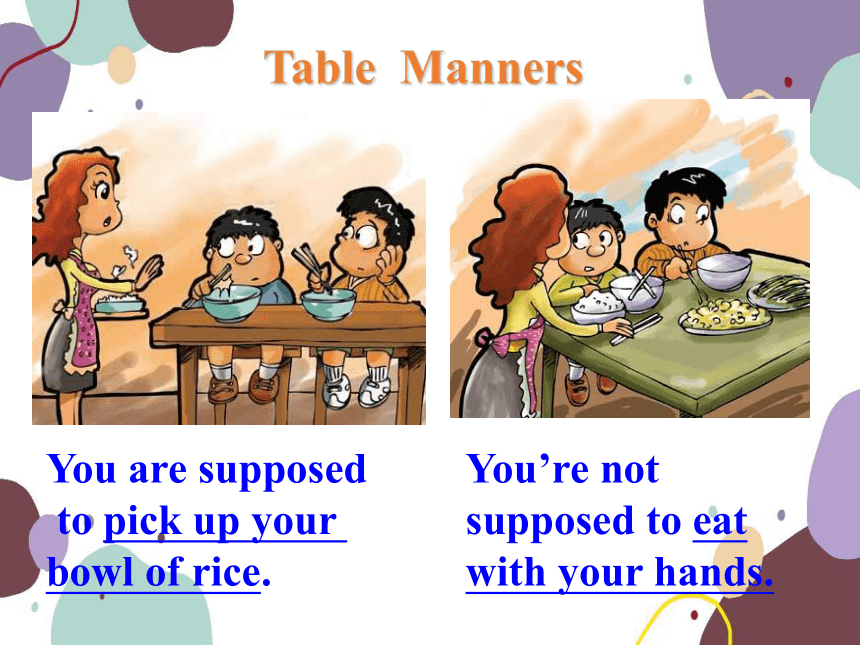
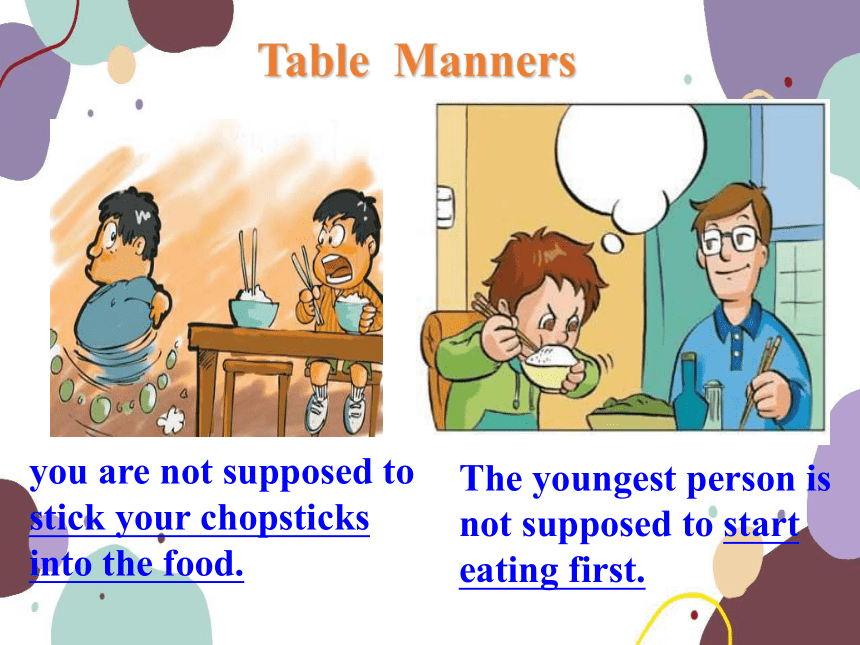
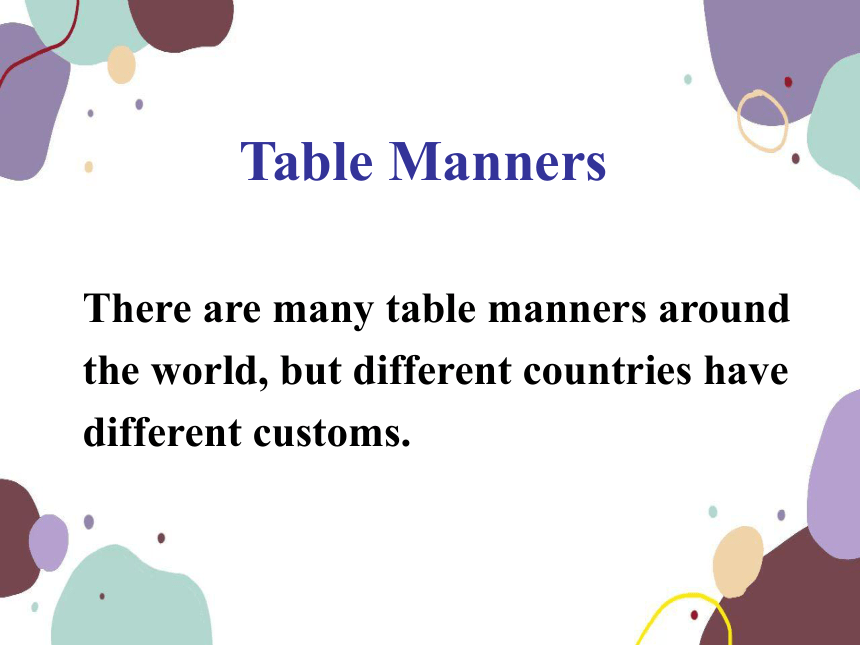
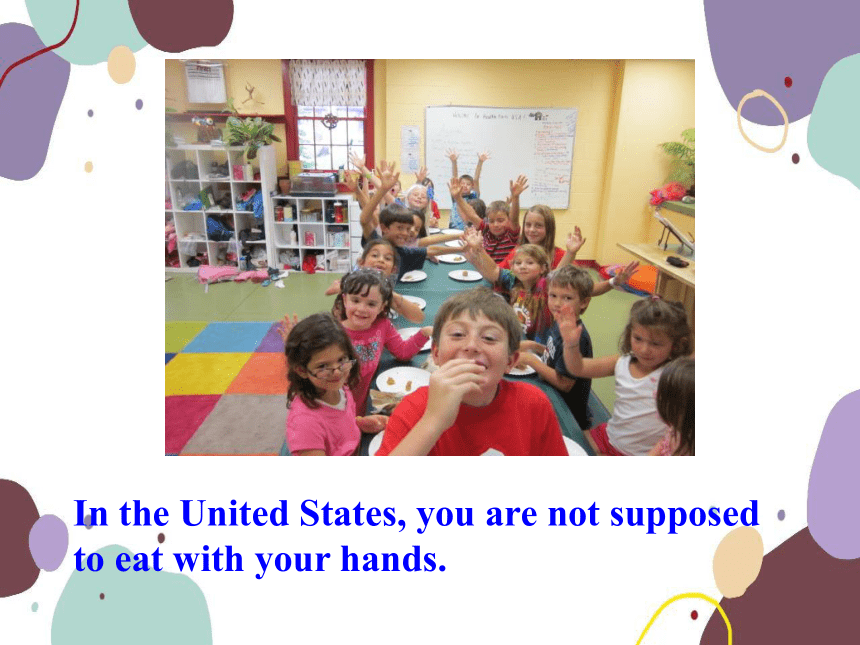
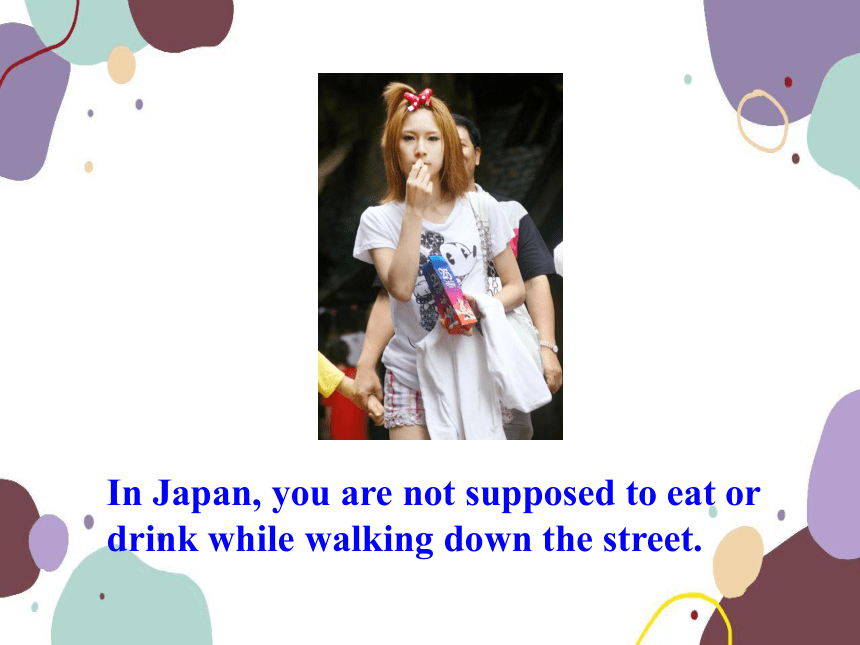
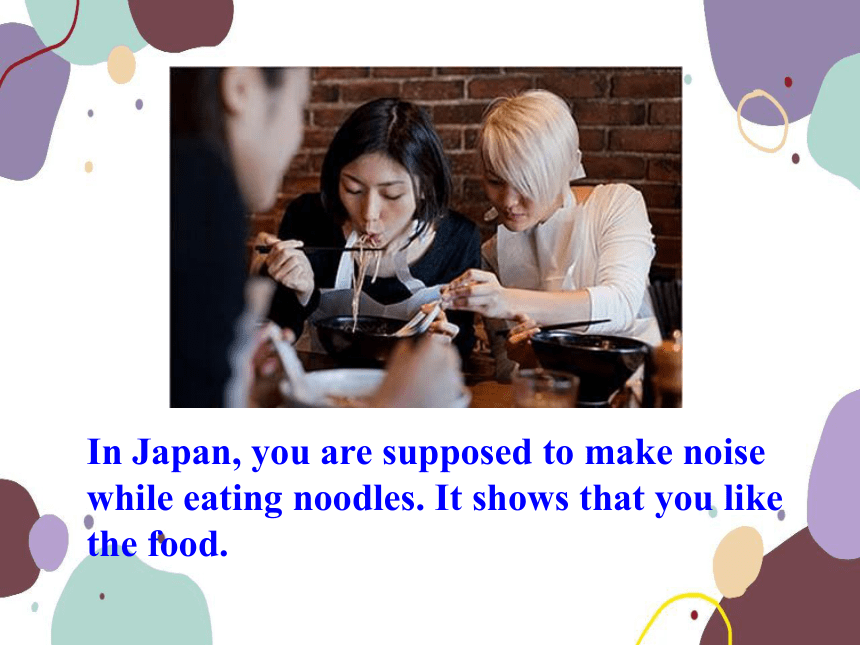
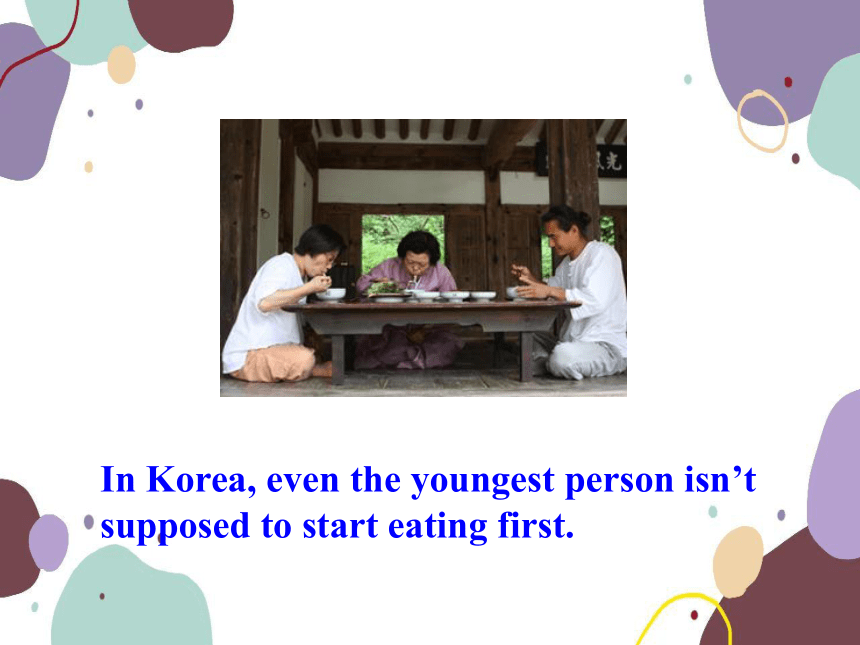
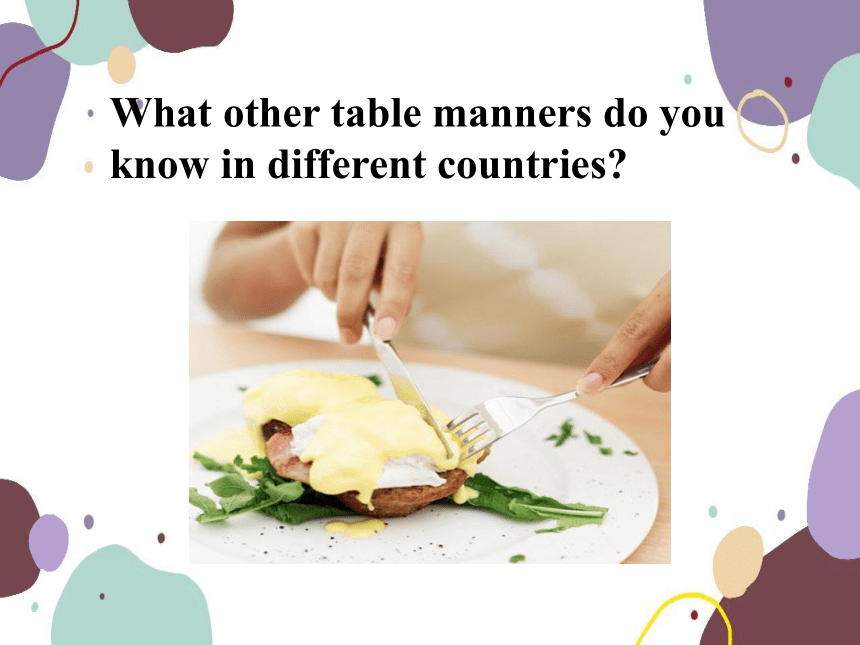
文档简介
(共68张PPT)
人教版九年级上册英语课件
Section B (1a-2e)
Unit 10 You’re supposed to shake hands.
根据句意完成句子, 每空一词。
1. 当你遇见某人时,你应该做什么?
What ______ you ______ ______ do when you meet someone
2.你应该六点打电话给我的。
You ______ ________ _____ _____ _____ at six.
3. 告诉孩子们在不同的情景下应如何去做。
Tell the children what they _______
_________ _____ do in different situations.
are
supposed to
were supposed to call me
are
supposed to
What are you supposed to do when you are invited to a party For example, time, coat, present, greetings and so on.
Free Talk
What are the table manners in China
Table Manners
You are supposed
to pick up your
bowl of rice.
You’re not supposed to eat with your hands.
Table Manners
you are not supposed to stick your chopsticks into the food.
The youngest person is not supposed to start eating first.
Table Manners
There are many table manners around the world, but different countries have different customs.
In the United States, you are not supposed to eat with your hands.
In Japan, you are not supposed to eat or drink while walking down the street.
In Japan, you are supposed to make noise while eating noodles. It shows that you like the food.
In Korea, even the youngest person isn’t supposed to start eating first.
What other table manners do you know in different countries
How much do you know about table manners around the world Take the following quiz. Circle T for true or F for false after each sentence.
1a
Mind your manners! 1. In India, you’re supposed to eat with your hands. T F
2. In China, you are not supposed to stick your chopsticks into the food. T F
3. In Korea, the youngest person is expected to start eating first. T F
4. In France, you’re supposed to put your bread on the table. T F
5. In China, it’s impolite to use your chopsticks to hit an empty bowl. T F
Describe the three pictures in 1b.
Free Talk
There is a bowl of rice on the table. Someone sticks a pair of chopsticks into the food.
There are three people in the picture. The young man is eating. The old man seems unhappy.
There are two children in the picture. The are talking. The girl is pointing at the boy with her chopsticks.
Listen and number the pictures in the order Yang Ming talk about them.
3
2
1
1b
____ 1. You’re not
supposed to …
____ 2. It’s impolite
to …
____ 3. You shouldn’t
…
Listen again. Match these sentence parts.
stick your chopsticks into your food.
b. point at anyone with your chopsticks.
start eating first if there are older people at the table.
c
a
b
1c
Listen again and answer the questions.
1. Where will Steve go tomorrow
2. How does he feel
He will go to China tomorrow.
He feels excited and nervous.
3. Why does he feel nervous
4. Why are people supposed to make noise when they are eating in Japan
5. Who is not allowed to talk at dinner table in Japan
Because he doesn’t know.
Because it.
Nobody.
What are you supposed to do when you are at school / at home
smoke
do our homework
get our ears pierced
speak loudly
be polite to…
clean up
stay up
drive a car
What are you supposed to do when you are at school / at home
wash the dishes
bring snacks to the classroom
choose our own clothes
make the bed by yourselves
run in the hallways
be late for school
Useful expressions
We are supposed to … / We are not supposed to …
We should / shouldn’t …
It’s polite / rude to …
We are allowed to …
We aren’t allowed to …
We can / could / can’t / couldn’t …
1d
Talk about other table manners in your country.
B: Yes, and it’s impolite to ...
A: We’re supposed to ...
make noise while eating noodles
√
eat or drink while walking down the street
stick your chopsticks into your food
point at anyone with your chopsticks
Can you compare the table manners in France and in China
Free Talk
Do you know about the table manners in other countries
Japan
It is OK to make noise when you eat noodles. It shows that you like the food.
It’s important to say traditional phrases of thanks before and after a meal.
Eat sushi whole. Dip the fish part rather than the rice into soy sauce.
Russia
Keep your hands in sight. It is not good manners to rest them on your lap. Keep your elbows off the table.
Leave some food on your plate to show that the host has given you enough to eat. Or the host will ask if you’d like to have a second helping. It’s polite to mop up excess sauce or gravy with bread.
America
If you empty a bottle into someone’s glass, it obliges that person to buy the next bottle. It’s polite to put the last drops into your own glass.
Japan
Don’t fill your own glass of alcohol; instead, you should pour for others and wait for them to reciprocate.
2a
What do you know about customs in foreign countries What do you think is the biggest challenge when visiting a foreign country
Would you please continue….
e.g. My cousin went to America, and she said that learning basic table manners was her biggest challenge. She never knew what she was supposed to do at the dinner table.
2b
Read the letter and answer the questions.
REVIEWING
Taking notes or summarizing the main ideas can help you move language from your short-term to long-term memory.
他们想尽一切办法,让我感到宾至如归
Dear Laura,
Thanks for your message. Yes, I’m having a great time on my student exchange program in France. I was a bit nervous before I arrived here but there was no reason to be. My host family is really nice. They go out of their way to make me feel at home.
The grandmother knows that I miss Chinese food a lot. So she actually learned how to make Chinese food! She also has a teenage granddaughter about my age. She’s really kind and she always talks to me in French to help me practice.
You wouldn’t believe how quickly my French has improved because of that. I’m very comfortable speaking French now. Although I still make lots of mistakes, it doesn’t worry me like it used to. My biggest challenge is learning how to behave at the dinner table. As you can imagine(想象), things are very different from the way they are at home.
For example, you’re not supposed to put your bread on your plate. You’re supposed to put it on the table! I thought that was pretty strange at first, but now I’m used to it.
Another example is that you’re not supposed to eat anything with your hands except(除…之外) bread, not even fruit. You have to cut it up and eat it with a fork. Another thing is it’s impolite to say that you’re full. If you don’t want any more food, you should just say, “That was delicious.”
Also, you’re not supposed to put your elbows on the table. I have to say that I find it difficult to remember everything, but I’m gradually getting used to it(渐渐习惯了). I don’t find French customs so strange anymore.
I’ll write again soon and tell you more about my life in France. Hope you’re having a good school year.
Yours,
Lin Yue
1.Why is Wang Kun in France
Because she is on her student exchange program in France.
Read the letter and answer the questions.
2. Does she enjoy staying with her host family How do you know
Yes, she does. She say her host family is really nice and they go out of their way to make her feel at home.
3.How does she feel about making mistakes when she speaks French
It doesn’t worry her like it used to be.
4. What is the biggest challenge
she is facing
Her biggest challenge is learning
how to behave at the dinner table.
Language points
1. You’re not supposed to eat anything with your hands except bread, not even fruit! 除了面包之外,你什么都不能用手拿着吃,甚至连水果也不能!
解析: except意为“除……之外”,不包括后面的内容。
Everyone in our class has seen the film ______ Tom.
A. besides B. beside C. except D. expect
解析 :选C。句意:我们班上除汤姆外,都看过这部电影了。except作介词,意为“除……之外”,不包含其后的人或物。
Language points
1)except 意为“除…之外”不包括后面内容。
Except B : A--B A、B 同类
A
B
Except/besides/ but/except for
Language points
2) Besides 意为“除..之外还有…”包括besides 后面的内容。
Besides B : A +B
A
B
Language points
3)but, but 与except 同义,如果句中有no one, nobody, nothing, all, everyone, everything, 多用but。
4)except for意为“除…之外”说明整体情况后,对细节加以纠正。
Except for B: A—B, A、B不同类,B为A部分加以修正的部分。
A
B
Language points
2. I have to say, I find it difficult to remember everything, but I’m gradually getting used to things and don’t find them so strange any more.
我不得不说,我觉得记住所有的规矩是很难的,但是我也渐渐习惯了这些,不再觉得它们奇怪了。
Language points
(1)在 I find it difficult to remember . . . 句中,it是形式宾语,真正的宾语是后面的动词不定式短语to remember everything。其句型结构为:find+ it + adj. + to do sth. 。类似用法的动词还有:think, believe, know, feel等。
(2)be/get used to 意为“习惯于……”,
后接名词、代词或动名词。
Language points
①I find ______ important to get along well with others.
A. that B. this C. it D. them
解析:选C。本题考查it 作形式宾语的用法。句中it代替不定式短语 “to get along well with others”作形式宾语。
Language points
②[11·衡阳中考]Tony used to ______ to school, but he is used to ______ to school now.
A. walk; taking a bus B. walked; took a bus
C. walk; take a bus D. walk; took a bus
解析:选A。句意:Tony过去常步行去上学,但他现在习惯了乘公共汽车去上学。used to“过去经常”,后接动词原形;be used to doing sth. “习惯于做某事”。故选A。
Language points
used to 表示“过去经常”,后接动词原形。
be/get used to 表示“习惯于”,后接名词、代词或动词-ing形式。
be used to do/be used for doing 表示“用于;被用来做”, 是动词use的被动结构。
Language points
Taking notes or summarizing the main
ideas can help you move language from
your short-term to long-term memory.
REVIEWING
be comfortable (doing)
went out of their way
(something) worry (someone)
gradually gotten used to being
2c
Read the sentences and replace the underlined words with the phrasesin the box.
1. Making mistakes in French used to make Lin Yue nervous.
( (something) worry (someone) )
2. It was quite hard for her to feel good about speaking French
( be comfortable (doing) )
3. The host family tried very hard to help Lin Yue.
(went out of their way)
4. Lin Yue has slowly learned how to be like her French friends.
(gradually gotten used to being)
Review the passage and make notes about French customs in the chart.
Dos Don’ts
You’re expected to put your bread on the table. You’re not supposed to put your bread on your plate
2d
e.g. In France, people put their bread on the table. But in China, we always put our food on a plate or in a bowl and never on the table.
2e
Compare the table manners in France and China in your group. How are they the same or different Make a list.
Please continue, the following sentences you may use as references…
make noise while eating
point at others with chopstick
say hello to others
wipe your mouth after dinner
talk loudly at the table
6. Eat with chopstick
7. Talk at the table
8. pick up the bowl to ea
9. start eating first
10. eat while walking in the street
11. Stick the chopsticks into the food
书面作业 (Writing work)
(1)默写所学的新单词
(2) 完成学生用书的相关作业
Homework
谢谢观看
人教版九年级上册英语课件
Section B (1a-2e)
Unit 10 You’re supposed to shake hands.
根据句意完成句子, 每空一词。
1. 当你遇见某人时,你应该做什么?
What ______ you ______ ______ do when you meet someone
2.你应该六点打电话给我的。
You ______ ________ _____ _____ _____ at six.
3. 告诉孩子们在不同的情景下应如何去做。
Tell the children what they _______
_________ _____ do in different situations.
are
supposed to
were supposed to call me
are
supposed to
What are you supposed to do when you are invited to a party For example, time, coat, present, greetings and so on.
Free Talk
What are the table manners in China
Table Manners
You are supposed
to pick up your
bowl of rice.
You’re not supposed to eat with your hands.
Table Manners
you are not supposed to stick your chopsticks into the food.
The youngest person is not supposed to start eating first.
Table Manners
There are many table manners around the world, but different countries have different customs.
In the United States, you are not supposed to eat with your hands.
In Japan, you are not supposed to eat or drink while walking down the street.
In Japan, you are supposed to make noise while eating noodles. It shows that you like the food.
In Korea, even the youngest person isn’t supposed to start eating first.
What other table manners do you know in different countries
How much do you know about table manners around the world Take the following quiz. Circle T for true or F for false after each sentence.
1a
Mind your manners! 1. In India, you’re supposed to eat with your hands. T F
2. In China, you are not supposed to stick your chopsticks into the food. T F
3. In Korea, the youngest person is expected to start eating first. T F
4. In France, you’re supposed to put your bread on the table. T F
5. In China, it’s impolite to use your chopsticks to hit an empty bowl. T F
Describe the three pictures in 1b.
Free Talk
There is a bowl of rice on the table. Someone sticks a pair of chopsticks into the food.
There are three people in the picture. The young man is eating. The old man seems unhappy.
There are two children in the picture. The are talking. The girl is pointing at the boy with her chopsticks.
Listen and number the pictures in the order Yang Ming talk about them.
3
2
1
1b
____ 1. You’re not
supposed to …
____ 2. It’s impolite
to …
____ 3. You shouldn’t
…
Listen again. Match these sentence parts.
stick your chopsticks into your food.
b. point at anyone with your chopsticks.
start eating first if there are older people at the table.
c
a
b
1c
Listen again and answer the questions.
1. Where will Steve go tomorrow
2. How does he feel
He will go to China tomorrow.
He feels excited and nervous.
3. Why does he feel nervous
4. Why are people supposed to make noise when they are eating in Japan
5. Who is not allowed to talk at dinner table in Japan
Because he doesn’t know.
Because it.
Nobody.
What are you supposed to do when you are at school / at home
smoke
do our homework
get our ears pierced
speak loudly
be polite to…
clean up
stay up
drive a car
What are you supposed to do when you are at school / at home
wash the dishes
bring snacks to the classroom
choose our own clothes
make the bed by yourselves
run in the hallways
be late for school
Useful expressions
We are supposed to … / We are not supposed to …
We should / shouldn’t …
It’s polite / rude to …
We are allowed to …
We aren’t allowed to …
We can / could / can’t / couldn’t …
1d
Talk about other table manners in your country.
B: Yes, and it’s impolite to ...
A: We’re supposed to ...
make noise while eating noodles
√
eat or drink while walking down the street
stick your chopsticks into your food
point at anyone with your chopsticks
Can you compare the table manners in France and in China
Free Talk
Do you know about the table manners in other countries
Japan
It is OK to make noise when you eat noodles. It shows that you like the food.
It’s important to say traditional phrases of thanks before and after a meal.
Eat sushi whole. Dip the fish part rather than the rice into soy sauce.
Russia
Keep your hands in sight. It is not good manners to rest them on your lap. Keep your elbows off the table.
Leave some food on your plate to show that the host has given you enough to eat. Or the host will ask if you’d like to have a second helping. It’s polite to mop up excess sauce or gravy with bread.
America
If you empty a bottle into someone’s glass, it obliges that person to buy the next bottle. It’s polite to put the last drops into your own glass.
Japan
Don’t fill your own glass of alcohol; instead, you should pour for others and wait for them to reciprocate.
2a
What do you know about customs in foreign countries What do you think is the biggest challenge when visiting a foreign country
Would you please continue….
e.g. My cousin went to America, and she said that learning basic table manners was her biggest challenge. She never knew what she was supposed to do at the dinner table.
2b
Read the letter and answer the questions.
REVIEWING
Taking notes or summarizing the main ideas can help you move language from your short-term to long-term memory.
他们想尽一切办法,让我感到宾至如归
Dear Laura,
Thanks for your message. Yes, I’m having a great time on my student exchange program in France. I was a bit nervous before I arrived here but there was no reason to be. My host family is really nice. They go out of their way to make me feel at home.
The grandmother knows that I miss Chinese food a lot. So she actually learned how to make Chinese food! She also has a teenage granddaughter about my age. She’s really kind and she always talks to me in French to help me practice.
You wouldn’t believe how quickly my French has improved because of that. I’m very comfortable speaking French now. Although I still make lots of mistakes, it doesn’t worry me like it used to. My biggest challenge is learning how to behave at the dinner table. As you can imagine(想象), things are very different from the way they are at home.
For example, you’re not supposed to put your bread on your plate. You’re supposed to put it on the table! I thought that was pretty strange at first, but now I’m used to it.
Another example is that you’re not supposed to eat anything with your hands except(除…之外) bread, not even fruit. You have to cut it up and eat it with a fork. Another thing is it’s impolite to say that you’re full. If you don’t want any more food, you should just say, “That was delicious.”
Also, you’re not supposed to put your elbows on the table. I have to say that I find it difficult to remember everything, but I’m gradually getting used to it(渐渐习惯了). I don’t find French customs so strange anymore.
I’ll write again soon and tell you more about my life in France. Hope you’re having a good school year.
Yours,
Lin Yue
1.Why is Wang Kun in France
Because she is on her student exchange program in France.
Read the letter and answer the questions.
2. Does she enjoy staying with her host family How do you know
Yes, she does. She say her host family is really nice and they go out of their way to make her feel at home.
3.How does she feel about making mistakes when she speaks French
It doesn’t worry her like it used to be.
4. What is the biggest challenge
she is facing
Her biggest challenge is learning
how to behave at the dinner table.
Language points
1. You’re not supposed to eat anything with your hands except bread, not even fruit! 除了面包之外,你什么都不能用手拿着吃,甚至连水果也不能!
解析: except意为“除……之外”,不包括后面的内容。
Everyone in our class has seen the film ______ Tom.
A. besides B. beside C. except D. expect
解析 :选C。句意:我们班上除汤姆外,都看过这部电影了。except作介词,意为“除……之外”,不包含其后的人或物。
Language points
1)except 意为“除…之外”不包括后面内容。
Except B : A--B A、B 同类
A
B
Except/besides/ but/except for
Language points
2) Besides 意为“除..之外还有…”包括besides 后面的内容。
Besides B : A +B
A
B
Language points
3)but, but 与except 同义,如果句中有no one, nobody, nothing, all, everyone, everything, 多用but。
4)except for意为“除…之外”说明整体情况后,对细节加以纠正。
Except for B: A—B, A、B不同类,B为A部分加以修正的部分。
A
B
Language points
2. I have to say, I find it difficult to remember everything, but I’m gradually getting used to things and don’t find them so strange any more.
我不得不说,我觉得记住所有的规矩是很难的,但是我也渐渐习惯了这些,不再觉得它们奇怪了。
Language points
(1)在 I find it difficult to remember . . . 句中,it是形式宾语,真正的宾语是后面的动词不定式短语to remember everything。其句型结构为:find+ it + adj. + to do sth. 。类似用法的动词还有:think, believe, know, feel等。
(2)be/get used to 意为“习惯于……”,
后接名词、代词或动名词。
Language points
①I find ______ important to get along well with others.
A. that B. this C. it D. them
解析:选C。本题考查it 作形式宾语的用法。句中it代替不定式短语 “to get along well with others”作形式宾语。
Language points
②[11·衡阳中考]Tony used to ______ to school, but he is used to ______ to school now.
A. walk; taking a bus B. walked; took a bus
C. walk; take a bus D. walk; took a bus
解析:选A。句意:Tony过去常步行去上学,但他现在习惯了乘公共汽车去上学。used to“过去经常”,后接动词原形;be used to doing sth. “习惯于做某事”。故选A。
Language points
used to 表示“过去经常”,后接动词原形。
be/get used to 表示“习惯于”,后接名词、代词或动词-ing形式。
be used to do/be used for doing 表示“用于;被用来做”, 是动词use的被动结构。
Language points
Taking notes or summarizing the main
ideas can help you move language from
your short-term to long-term memory.
REVIEWING
be comfortable (doing)
went out of their way
(something) worry (someone)
gradually gotten used to being
2c
Read the sentences and replace the underlined words with the phrasesin the box.
1. Making mistakes in French used to make Lin Yue nervous.
( (something) worry (someone) )
2. It was quite hard for her to feel good about speaking French
( be comfortable (doing) )
3. The host family tried very hard to help Lin Yue.
(went out of their way)
4. Lin Yue has slowly learned how to be like her French friends.
(gradually gotten used to being)
Review the passage and make notes about French customs in the chart.
Dos Don’ts
You’re expected to put your bread on the table. You’re not supposed to put your bread on your plate
2d
e.g. In France, people put their bread on the table. But in China, we always put our food on a plate or in a bowl and never on the table.
2e
Compare the table manners in France and China in your group. How are they the same or different Make a list.
Please continue, the following sentences you may use as references…
make noise while eating
point at others with chopstick
say hello to others
wipe your mouth after dinner
talk loudly at the table
6. Eat with chopstick
7. Talk at the table
8. pick up the bowl to ea
9. start eating first
10. eat while walking in the street
11. Stick the chopsticks into the food
书面作业 (Writing work)
(1)默写所学的新单词
(2) 完成学生用书的相关作业
Homework
谢谢观看
同课章节目录
- Unit 1 How can we become good learners.
- Section A
- Section B
- Unit 2 I think that mooncakes are delicious!
- Section A
- Section B
- Unit 3 Could you please tell me where the restroom
- Section A
- Section B
- Unit 4 I used to be afraid of the dark.
- Section A
- Section B
- Unit 5 What are the shirts made of?
- Section A
- Section B
- Review of Units 1-5
- Unit 6 When was it invented?
- Section A
- Section B
- Unit 7 Teenagers should be allowed to choose their
- Section A
- Section B
- Unit 8 It must belong to Carla.
- Section A
- Section B
- Unit 9 I like music that I can dance to.
- Section A
- Section B
- Unit 10 You're supposed to shake hands.
- Section A
- Section B
- Review of Units 6-10
- Unit 11 Sad movies make me cry.
- Section A
- Section B
- Unit 12 Life is full of the unexpected
- Section A
- Section B
- Unit 13 We're trying to save the earth!
- Section A
- Section B
- Unit 14 I remember meeting all of you in Grade 7.
- Section A
- Section B
- Review of Units 11-14
